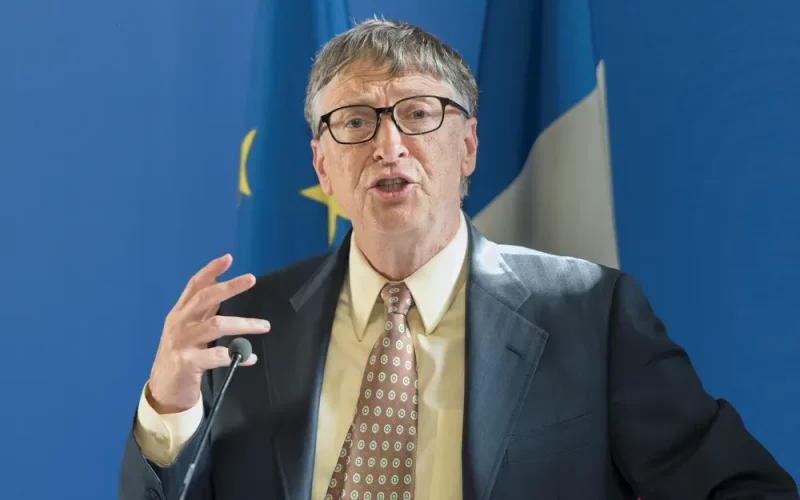Bill Gates, who is worth an estimated $7 billion, recently seemed to backtrack on some of his prior statements about climate change.
“There’s a lot of climate exaggeration,” said Gates at a recent event. “The climate is not the end of the planet. So the planet is going to be fine.”
Gates made the remark at the Earthshot Prize Innovation Summit, which was also attended by billionaire Michael Bloomberg and British Prince William.
A few days later, at a New York Times event, he made a similarly climate-related remark. As Gates put it, “there are effects on humanity, the planet less so,” and “no temperate country is going to become uninhabitable.”
Gates added at the NY Times event that if world leaders are going to implement climate polices, it cannot be achieved by using “brute force.”
“If you try to do climate brute force, you will get people who say, ‘I like climate but I don’t want to bear that cost and reduce my standard of living,’” Gates remarked. “Without innovation, it’s unlikely, particularly in middle-income countries, that the brute force approach will be successful.”
He did not provide specifics, but he did call for increased support from both political parties for legislation addressing climate change.
“You can’t have a climate policy that when one party is in charge goes full speed ahead and stops cold,” he said. “These are 30-year investments in steel factories.”
“It’s pretty clear we’re not going to go to extreme scenarios,” he added. “Emissions will peak and then start to go down. They won’t go down as fast as we want them to and so the temperature will continue to rise and once the temperature has risen it doesn’t go down very quickly, unless you do massive carbon removal.”
Furthermore, Mr. Gates claimed in the NY Times event that he is “the person who’s doing the most on climate in terms of the innovation and in how we can square multiple goals,” implying that he is an authority on climate change issues because of the money he has donated to the cause.
Among Mr. Gates’s previous climate-related warnings was a prediction that by 2020, climate change would be responsible for more human deaths and suffering than the current COVID-19 pandemic. At the time, he remarked that “as awful as this pandemic is, climate change could be worse,” adding that international leaders must “accelerate our efforts now” to “avoid a climate disaster.”
Mr. Gates is also the largest private owner of farmland in the United States, having amassed a vast portfolio of agricultural property over the past few years. Mr. Gates has said that conventional farming methods have a negative impact on the environment, and he has advocated for the use of synthetic or plant-based meat as a solution to this problem.
The Nobel Laureate in Physics, John Clauser, has recently cast doubt on the accuracy of climate models by claiming that scientists have neglected a crucial factor. Nearly 1,600 scientists, including him, signed a pledge denying the existence of a “climate emergency” and noting that evidence from Earth’s past demonstrates that the climate has always been shifting, with or without human influence.
“In addition, [climate models] ignore the fact that enriching the atmosphere with CO2 is beneficial,” their declaration said.
In addition, they said that mainstream scientists create a “popular narrative” that is actually a “corruption of science that threatens the world’s economy and the well-being of billions of people.”
“Misguided climate science has metastasized into massive shock-journalistic pseudoscience. In turn, the pseudoscience has become a scapegoat for a wide variety of other unrelated ills,” it added. “It has been promoted and extended by similarly misguided business marketing agents, politicians, journalists, government agencies, and environmentalists. In my opinion, there is no real climate crisis.”
“There is, however, a very real problem with providing a decent standard of living to the world’s large population and an associated energy crisis. The latter is being unnecessarily exacerbated by what, in my opinion, is incorrect climate science.”
Before that, two well-known scientists from MIT and Princeton University had forewarned of impending EPA measures to reduce carbon dioxide emissions from power plants. Their August testimony stated that the rules “will be disastrous for the country, for no scientifically justifiable reason.”
“The unscientific method of analysis, relying on consensus, peer review, government opinion, models that do not work, cherry-picking data and omitting voluminous contradictory data, is commonly employed in these studies and by the EPA in the Proposed Rule,” William Happer, professor emeritus in physics at Princeton University, and Richard Lindzen, professor emeritus of atmospheric science at MIT, wrote. “None of the studies provides scientific knowledge, and thus none provides any scientific support for the Proposed Rule.”
Dr. Judith Curry, another prominent climate scientist who was once in the alarmist camp, as reversed herself and has refuted that there is a global “climate emergency.”
Curry reveals how the 2009 ClimateGate scandal opened her eyes about how Academia was policing the climate crisis narrative.
In an interview with famed independent journalist John Stossel, Dr. Curry revealed how she changed her position drastically after educating herself on the broader picture of the climate change issue and the influence of radical groups and anti-capitalists exploiting it to push a political agenda.
It’s no wonder that the New York Times turned the comments off on the Bill Gates interview. The tide is turning against the radical groups’ climate crisis narrative.

